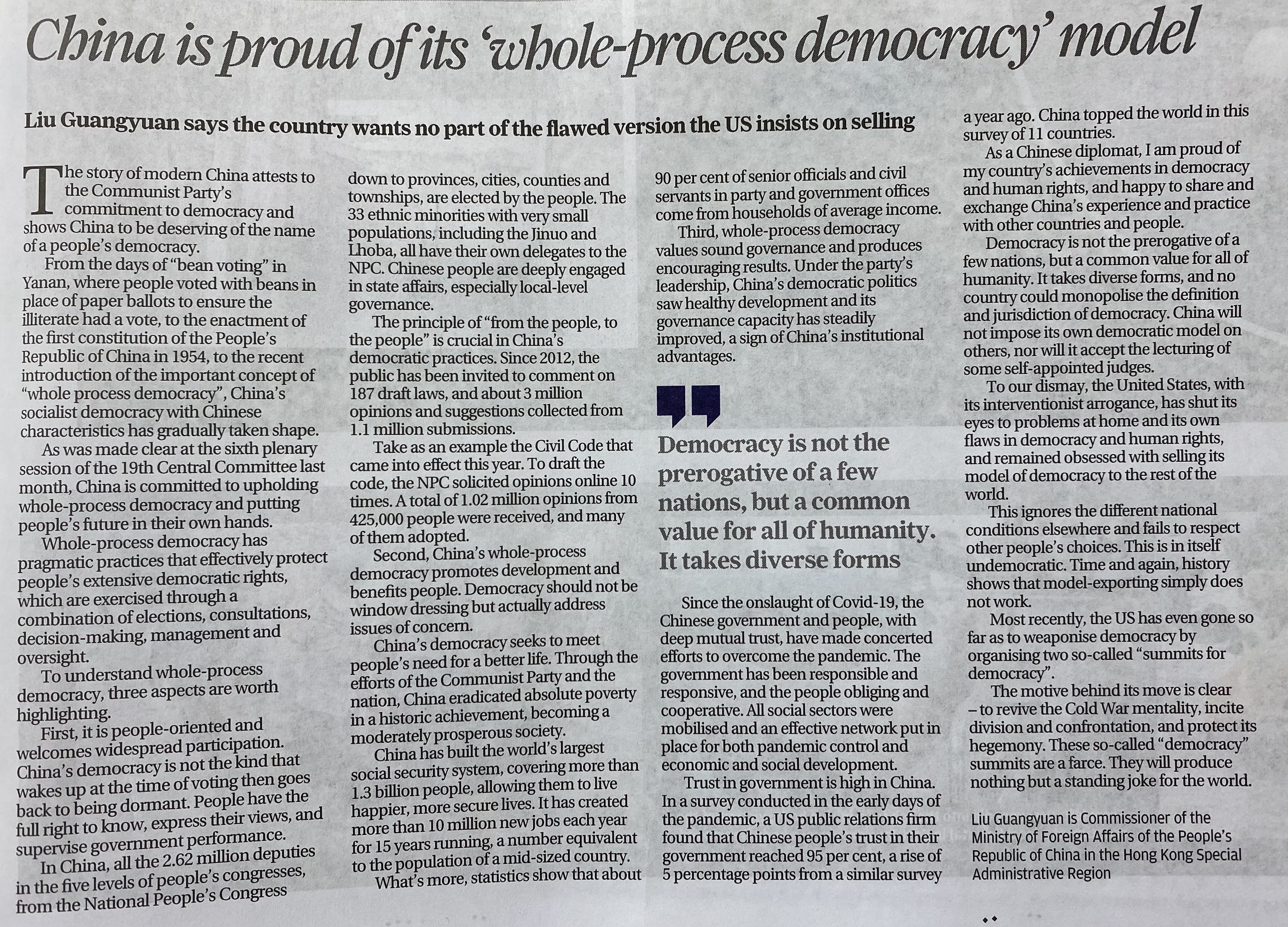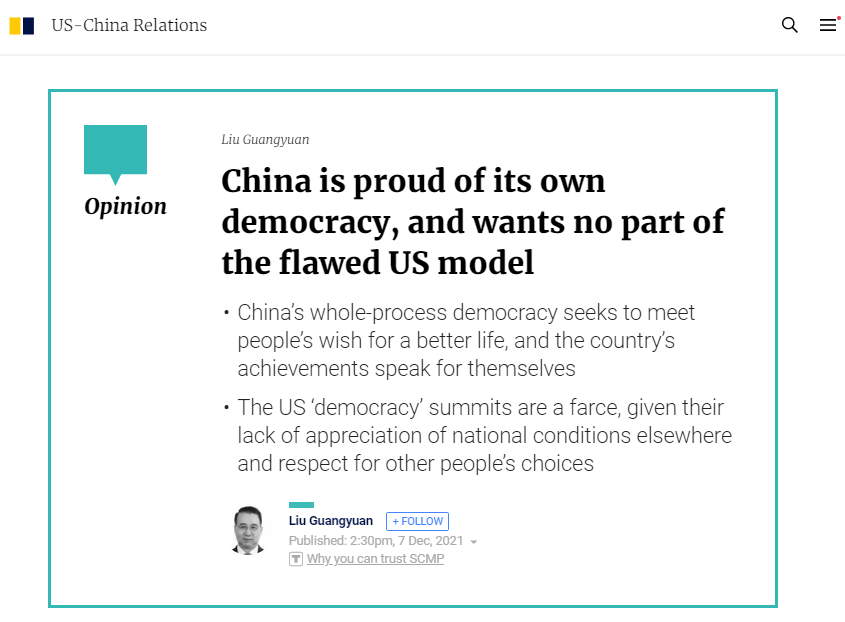2021年12月8日,外交部驻港公署刘光源特派员在《南华早报》发表题为《读懂中国全过程人民民主》的署名文章,强调中国是当之无愧的民主国家,从“全人民、全链条”“惠民生、促发展”“施良政、讲善治”三个维度阐述中国全过程人民民主的内涵,并有力批驳美国拼凑“民主峰会”的险恶用心。文章7日亦在该报网页版刊登。全文如下:


读懂中国全过程人民民主
历史和现实充分证明,中国共产党始终高举人民民主旗帜,中国是当之无愧的民主国家。近代以来,中国人民为争取民主英勇斗争,但只有在中国共产党领导下,才真正获得当家作主的权利。从延安窑洞的“豆选”到北京人民大会堂“五四宪法”的制定修订,再到以习近平同志为核心的党中央提出全过程人民民主重大理念,中国特色社会主义民主落地生根,繁荣发展。刚刚胜利召开的中国共产党十九届六中全会强调,必须发展全过程人民民主,保障人民当家作主。
中国全过程人民民主是有效维护人民广泛真实权利的民主,具有丰富内涵和完整的实践体系,包括选举民主、协商民主、社会民主、基层民主、公民民主等民主政治全部要素,涵盖了民主选举、民主协商、民主决策、民主管理、民主监督等民主过程的一切领域,是全链条、全方位、全覆盖的民主,是最广泛、最真实、最管用的社会主义民主。我愿从以下三个方面帮助大家读懂中国的全过程人民民主。
第一,全过程人民民主是全人民、全链条的民主。中国人民不是只有投票时被唤醒,而是充分享有知情权、表达权、监督权等贯穿于人民政治生活实践全过程的民主。当前,中国从中央到省区市县乡有五级人大代表共262万多名,都是由选民选举出来,基诺族、珞巴族等33个人口特少的少数民族均拥有全国人大代表名额。人民广泛参加国家事务特别是基层的管理,行使宪法赋予公民的权利。“从群众中来,到群众中去”是中国民主实践的重要方法。2012年以来,中国共有187件次法律草案向社会征求意见,约110万人次提出300多万条意见建议。《中华人民共和国民法典》在编纂过程中,先后十次通过人大网公开征求意见,累计收到42.5万人提出的102万条意见建议,许多重要意见得到采纳。
第二,全过程人民民主是惠民生、促发展的民主。民主不是装饰品和摆设,而是用来解决人民要解决的问题的。中国全过程人民民主从人民实际需求出发,在不断满足人民美好生活需要的过程中,逐步提升民主的品质和成色。经过全党全国各族人民持续奋斗,2021年中华大地上全面建成小康社会,历史性地解决了绝对贫困问题;中国建起了世界规模最大的社会保障体系和全民医疗保障网,覆盖13亿多人口;人民群众的生活更加殷实,幸福感、获得感、安全感更加充实、更有保障、更可持续。就业是最大的民生,中国每年新增就业连续15年保持在1000万人以上,相当于每年增加一个中等国家的全部人口。有数据显示,中国党政机关和各行各业的高级干部和公务员中,约有90%来自普通家庭。
第三,全过程人民民主是施良政、讲善治的民主。在中国共产党领导下,中国民主政治健康发展,国家治理能力不断提升,充分彰显“中国之治”的制度优势。新冠疫情发生以来,中国政府和人民相互信任、协同努力,充分发挥基层民主活力和优势,不仅政府高度负责、反应迅速,公民也能自觉自律、密切配合,社会各界力量得到广泛动员,构建起高效严密的防控网络,确保统筹推进疫情防控和经济社会发展。2020年7月,美国公关公司调查显示,中国人民对政府信任度较疫情爆发之初上升5个百分点达95%,连续3年排名世界第一。2021年5月,西班牙中国政策观察网站发表《当民主就是信任》的文章指出,不承认中国拥有西方许多所谓“民主国家”都想拥有的公民支持度,是有失公允的。
作为中国外交人员,我为国家在促进民主和人权方面取得的成就感到自豪,也乐于同其他国家和人民分享交流中国的经验做法。但我更知道,民主不是某个国家的专利,而是全人类共同价值。世界民主模式是多样多彩的,没有任何一个国家有资格垄断对民主的定义权和裁判权,中国不会把自己的模式强加于人,也不会接受别人“教师爷”般颐指气使的说教。
令人遗憾的是,长期以来,美国带着种族主义优越和干涉主义傲慢,无视自己国内问题和民主人权缺陷,无视不同国家国情和人民选择,在世界各地强硬推行自身模式,这本身就不民主,也不文明,早已被一次次失败无情打脸。现如今它又跳出来拼凑所谓“民主峰会”,赤裸裸地把民主“工具化”“武器化”,其实质就是要复活冷战思维,挑动分裂对立,服务自身霸权图谋。这种打着民主旗号破坏民主的行径,不但被世人嘲笑,也注定以失败告终!
China is proud of its ‘whole-process democracy’ model
The story of modern China attests to the Communist Party’s commitment to democracy and shows China to be deserving of the name of a people’s democracy.
From the days of “bean voting” in Yanan, where Chinese people voted with beans in place of paper ballots to ensure the illiterate had a vote, to the enactment of the first constitution of the People’s Republic of China in 1954, to the recent introduction of the important concept of “whole process democracy”, China’s socialist democracy with Chinese characteristics has gradually taken shape. As was made clear at the sixth plenary session of the 19th Central Committee last month, China is committed to upholding whole-process democracy and putting people’s future in their own hands.
China’s whole-process democracy has pragmatic practices that effectively protect people’s extensive democratic rights, which are exercised through a combination of elections, consultations, decision-making, management and oversight.
To understand whole-process democracy, three aspects are worth highlighting.
First, it is people-oriented and welcomes widespread participation. China’s democracy is not the kind that wakes up at the time of voting then goes back to being dormant afterwards. People have the full right to know, express their views, and supervise government performance.
In China, all the 2.62 million deputies in the five levels of people’s congresses, from the National People’s Congress down to provinces, cities, counties and townships, are elected by the people. The 33 ethnic minorities with very small populations, including the Jinuo and Lhoba, all have their own delegates to the NPC. Chinese people are deeply engaged in state affairs, especially local-level governance.
The principle of “from the people, to the people” is crucial in China’s democratic practices. Since 2012, the public has been invited to comment on 187 draft laws, and about 3 million opinions and suggestions collected from 1.1 million submissions.
Take as an example the Civil Code that came into effect this year. To draft the code, the NPC solicited opinions online 10 times. A total of 1.02 million opinions from 425,000 people were received, and many of them adopted.
Second, China’s whole-process democracy promotes development and benefits people. Democracy should not be window dressing but actually address issues of concern.
China’s democracy seeks to meet people’s need for a better life. Through the efforts of the Communist Party and the nation, China eradicated absolute poverty in a historic achievement, becoming a moderately prosperous society.
China has built the world’s largest social security system, covering more than 1.3 billion people, allowing them to live happier, more secure lives. It has created more than 10 million new jobs each year for 15 years running, a number equivalent to the population of a mid-sized country.
What’s more, statistics show that about 90 per cent of senior officials and civil servants in party and government offices come from households of average income.
Third, whole-process democracy values sound governance and produces encouraging results. Under the party’s leadership, China’s democratic politics saw healthy development and its governance capacity has steadily improved, a sign of China’s institutional advantages.
Since the onslaught of Covid-19, the Chinese government and people, with deep mutual trust, have made concerted efforts to overcome the pandemic. The government has been responsible and responsive, and the people obliging and cooperative. All social sectors were mobilised and an effective network put in place for both pandemic control and economic and social development.
Trust in government is high in China. In a survey conducted in the early days of the pandemic, a US public relations firm found that Chinese people’s trust in their government reached 95 per cent, a rise of 5 percentage points from a similar survey a year ago. China topped the world in this survey of 11 countries.
As a Chinese diplomat, I am proud of my country’s achievements in democracy and human rights, and happy to share and exchange China’s experience and practice with other countries and people.
Democracy is not the prerogative of a few nations, but a common value for all of humanity. It takes diverse forms, and no country could monopolise the definition and jurisdiction of democracy. China will not impose its own democratic model on others, nor will it accept the lecturing of some self-appointed judges.
To our dismay, the United States, with its interventionist arrogance, has shut its eyes to its problems at home and its own flaws in democracy and human rights, and remained obsessed with selling its model of democracy to the rest of the world.
This ignores the different national conditions elsewhere and fails to respect other people’s choices. This is in itself undemocratic. Time and again, history shows that model-exporting simply does not work.
Most recently, the US has even gone so far as to weaponise democracy by organising two so-called “summits for democracy”.
The motive behind its move is clear – to revive Cold War mentality, incite division and confrontation, and protect its hegemony. These so-called “democracy” summits are a farce. It will produce nothing but a standing joke for the world.